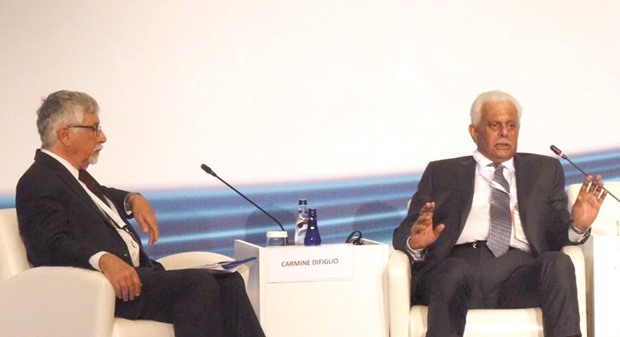Financial reserves accumulated by the GCC countries, estimated at $2.45tn in recent years when the oil prices were high, will allow them to use their savings to fund expenses and mitigate the impact of falling prices, said HE Abdullah bin Hamad al-Attiyah, former Deputy Premier and Minister of Energy and Industry.
Al-Attiyah, also the chairman of the Abdullah Bin Hamad Al-Attiyah International Foundation for Energy and Sustainable Development, was addressing a panel session at the Sabanci University in Turkey on Thursday.
But in the long term, the utilisation of foreign reserves to finance spending may reduce the size of the sovereign funds, and thus challenge future financial stability and exchange rates, al-Attiyah noted.
When oil prices drop, oil-exporting countries experience significant decline in government revenue, public spending, current account balance and international reserves.
The impact of lower oil prices differ from one Gulf country to another; nonetheless to help address the large budget deficits, Gulf Cooperation Council policymakers have adopted a mix of spending cuts and revenue-raising measures, al-Attiyah pointed out.
In the light of current oil prices, none of the oil-exporting countries are likely to have a fiscal break-even price below the actual oil price, he said.
On how the economic slowdown in the Middle East acted as a driving force for the shift away from traditional fuels, al-Attiyah said, “The GCC’s renewable energy sector is still at an early stage development. Nonetheless, renewable energy provides an opportunity for the GCC, which can only be realised through supportive policies and legislation, incentives for investment, generation targets and guidelines for energy conservation.”
Facilitating the diversification of the energy supply mix away from the reliance on petroleum and natural gas would increase long-term energy security by exploiting renewables, as opposed to finite energy resources, he said. Power generation based on renewable energy is becoming more cost effective, hence can compete with conventional sources in meeting the rapid growing energy demand.
“Electricity produced from renewables means less oil and gas have to be consumed domestically, freeing them up for exports. It would increase oil and gas export revenue. The resulting economic development of renewable energy can potentially create high-value jobs and opportunities for capital investment,” al-Attiyah said.
The GCC countries are endowed with solar resources. However, their position in global energy markets over the past decades has been shaped by their role as producers, exporting the majority of domestically produced oil and gas. Rising domestic energy demand, driven by rapid industrialisation, growing population and increasing water desalination, is reducing the share of production that can be exported.
On economic diversification in the GCC countries, al-Attiyah said, “The aims of diversification are to reduce the region’s long-term vulnerability to demand shifts, create jobs for GCC nationals in more knowledge-intensive industries, and to prepare for the eventual transition to a post-hydrocarbons economy.”

HE al-Attiyah (right) speaks at a panel session on u201cDiversification of Middle Eastern Economies from Oil Exportsu201d at a conference in Turkey recently.
